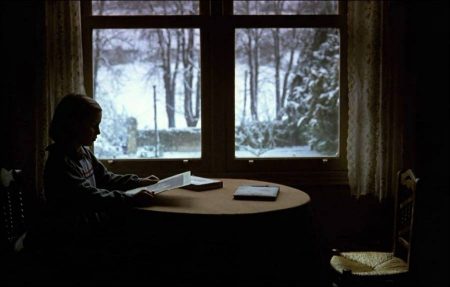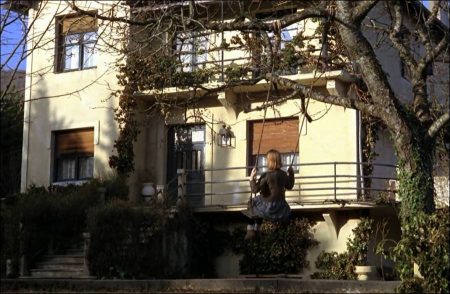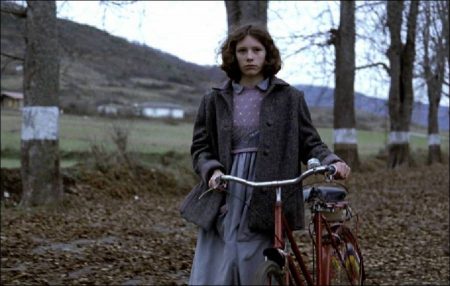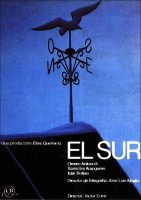The South
Taglines: Sur est un seul et grand Tango.
El Sur (The South) is the story of Estrella (Iciar Bollain), a little girl from Southern Spain who has been uprooted to the North. Estrella maintains a sentimentalized attachment to the region of her birth, an attachment manifested in her love for her father (Omero Antonutti). The girl’s rose-colored memories are shattered when she learns that her beloved dad once carried on affair with a Southern woman-and that the flames of passion still smolder within him. This Spanish/Argentinian coproduction was filmed on location in Madrid, Navarre, Vittoria, and Zamora.
El Sur (English: The South) (1990) is a TV movie written and directed by Carlos Saura and is a chapter in the Spanish TV series Los Cuentos de Borges (English: The Borges Tales). Saura’s 55-minute film is based on the short story El Sur by Argentine author Jorge Luis Borges. The film stars are Óscar Martínez, Nini Gambier, Gerardo Romano, Arturo Bonin, Jorge Marrale, Aurore Clément, Rafaela Aparicio, Lola Cardona, Icíar Bollaín, Maria Caro, Germaine Montero, Francisco Merino and María Massip.
Film Review for El Sur
Of all the 20th century’s major conflicts, the Spanish Civil War (1936-1939) is likely the least represented, cinematically speaking. Although there are a handful of great films that tackle the conflict, it is likely the presence of dictator Francisco Franco, who held power until his death in 1975, that prevented Spanish filmmakers from honestly tackling the Civil War. Guillermo del Toro, a Mexican director, may have reinvigorated interest in the Civil War in films The Devil’s Backbone (2001) and Pan’s Labyrinth (2006), but Spanish filmmaker Victor Erice got there first with The Spirit of the Beehive (1973) and El Sur (1983).
Both of Erice’s films deal with the austerity of life in Francoist Spain as seen through the eyes of a child. The Spirit of the Beehive takes place shortly after the war, where a young girl becomes fascinated with the film Frankenstein. El Sur, however, takes place later. An adult narrator, Estrella, looks back at two distinct periods during her childhood in the 1950s. We first meet the teenage Estrella when she awakes, finding a small box containing her father’s pendulum under her pillow.
Though the ghosts of the Spanish Civil War hover over El Sur, Erice is essentially telling the story of a different rupture. The film flashes back to when Estrella is eight years old, a time when she views her eccentric father as a magical being. A doctor and a dowser, Agustín (Omero Antonutti) has a murky past. Estrella knows that he grew up in Sevilla, in Spain’s south, but following a break with his own father, Agustín moved to a small city in the north, vowing never to return home. Though Estrella longs for her father’s attention, Agustín is moody, spending time alone in the attic or off in the countryside. Estrella’s mother, a teacher who was persecuted by Franco, implores her daughter to leave him alone.
Then, two women arrive for Estrella’s communion. Agustín’s mother and Milagros, Agustín’s nanny, come bearing tidings of the past. Unable to cope with the visit, Agustín takes to the hills to go shooting, perhaps even missing the communion. That evening, Estrella shares a room with Milagros who sheds some light on her father’s history. In one of the best, most succinct descriptions of a conflict, Milagros explains that before the war Agustín was on the side of the good guys and that his father aligned himself with the bad ones. Then the war ended and suddenly Agustín’s friends became the bad ones. In this compact scene, Erice has boiled down the heartbreaking futility of war into a few lines.
Desperate to learn more about her father, Estrella snoops around the house and finds a woman’s name written over and over again. She soon discovers that the name belongs to an actress. Estrella figures the woman belongs to her father’s mysterious past and wonders if he is truly in love with someone other than her own mother.
Just like Spain splintered in two during the 1930s, the relationship between Agustín and Estrella is strained by the time she reaches her teenage years. She is no longer enamored with her father. She finds him selfish and has shut him out of her life, even when he expresses interest in her budding feelings for a local boy. All the years of loneliness and depression have caught up with Estrella. When Agustín makes an effort, it’s too late.
With El Sur, Erice created a quiet, heartbreaking work of broken dreams and the empty spaces that punctuate a broken childhood. It’s about the moments when past regrets overtake any hope of joy in the present. It is the story of a time and a place under the thumb of a cruel dictator. Yet, Erice and El Sur speak universal truths about the divide that grows between father and child, country and son, ruptures that still persist even as history turns away from the bloody roots of the 20th century.
El Sur (1988)
Directed by: Carlos Saura
Starring: Óscar Martínez, Nini Gambier, Gerardo Romano, Arturo Bonin, Jorge Marrale, Aurore Clément, Rafaela Aparicio, Lola Cardona, Icíar Bollaín, Maria Caro, Germaine Montero, Francisco Merino, María Massip
Screenplay by: Carlos Saura
Production Design by: Antonio Belizón
Cinematography by: José Luis Alcaine
Film Editing by: Pablo G. del Amo
Costume Design by: Pablo G. del Amo
Music by: Enric Granados, Luis de Pablo
MPAA Rating: None.
Distributed by: New Yorker Films
Release Date: January 15, 1988
Views: 174



